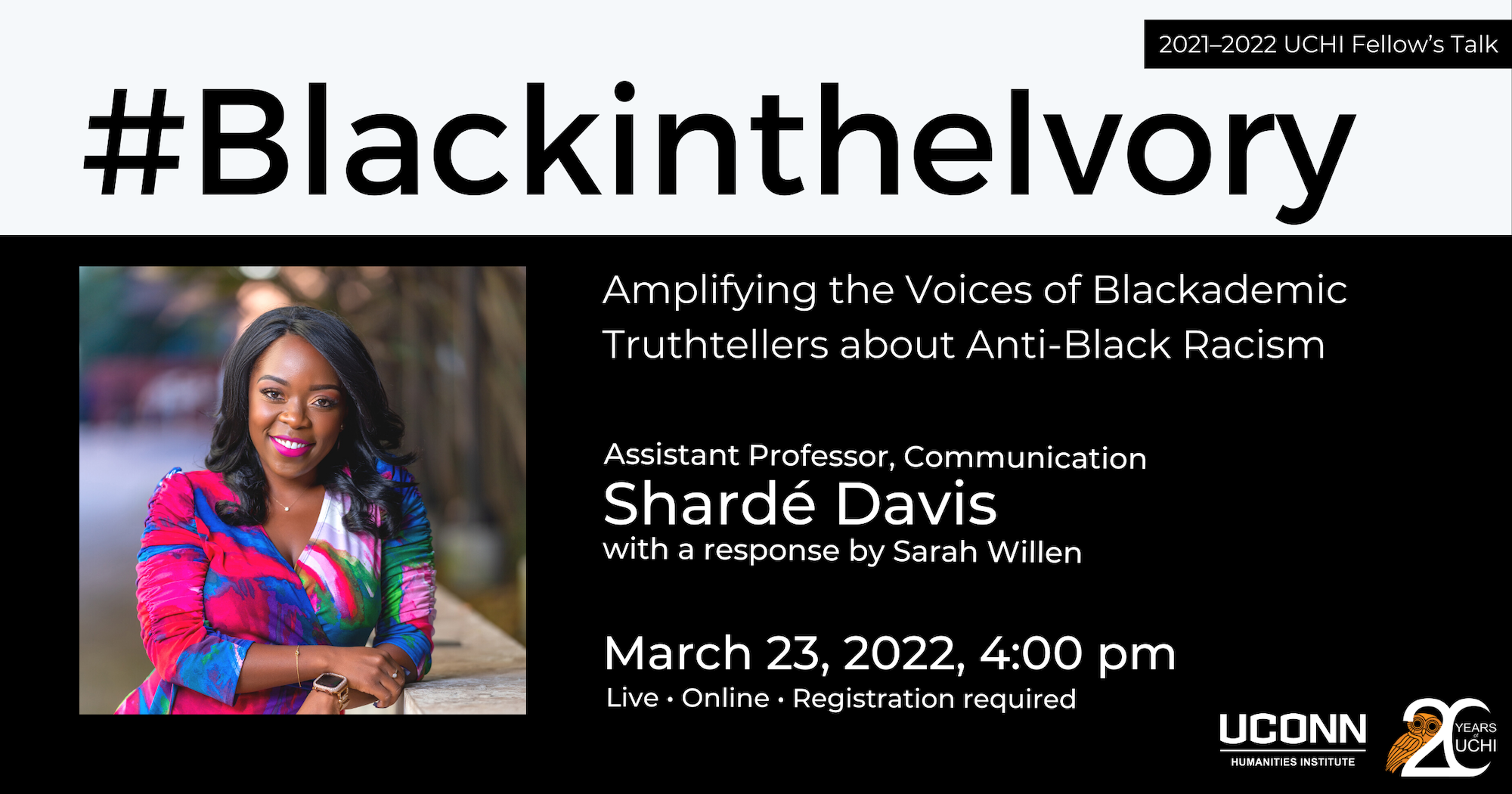#BlackintheIvory: Amplifying the Voices of Blackademic Truthtellers about Anti-Black Racism
Shardé M. Davis (Assistant Professor, Communication, UConn)
with a response by Sarah S. Willen (Anthropology, UConn)
Wednesday, March 23, 2021, 4:00pm
Live. Online. Registration required.
A Black professor is walking down the hallway and mistaken for a custodial staff person. A Black student is told that she only received her medical scholarship because of her race. A Black research scientist is physically blocked from the university mail room, and the police are called, even though she has her university ID on her.
In June 2020, Dr. Shardé M. Davis created a Twitter hashtag #BlackintheIvory to document the racism experienced by Blackademics. Thousands used the hashtag on various social media platforms to share their stories, demonstrating that racism in the academy knew no disciplinary bounds. Indeed, Blackademics at all career points and across multiple decades have encountered systemic racism in the academy.
In this talk, Dr. Davis will discuss the concurrent struggles and triumphs of being Black in the Ivory and how Blackademics (faculty and graduate students) are standing in their right as “truth tellers” to talk back and resist the racist systems that have historically oppressed them. Dr. Davis will detail the story of the #BlackintheIvory Twitter hashtag as well as provide an overview of the book as well as its purpose and goals.
Dr. Shardé M. Davis is an Assistant Professor in the Department of Communication and Faculty Affiliate of various research institutes at the University of Connecticut. Her research examines the way Black women leverage communication in the sistah circle to invoke collective identity, erect and fortify the boundaries around their homeplace, and backfill the necessary resources to return to white/male dominant spaces in American society. These ideas have been published in over 40 peer-refereed articles and invited book chapters, and are best represented in her theory, The Strong Black Woman Collective. Her research was formally recognized with the 2018 American Postdoctoral Fellowship from the American Association of University Women and the 2019 Ford Foundation Postdoctoral Fellowship. In addition to her program of research, Dr. Davis created the viral Twitter Hashtag #BlackintheIvory, which extended a timely opportunity for Blackademic TRUTHtellers to share personal instances (and engage in necessary conversations) about anti-Black racism in academia. She is also the inaugural recipient of the 2021-2022 Faculty of Color Working Group Fellowship funded by the Andrew W. Mellon Foundation to edit a new book for #BlackintheIvory that is set to publish in 2023 by the University of North Carolina Press.
Sarah S. Willen is Associate Professor of Anthropology at UConn and Director of the Research Program on Global Health and Human Rights at the university’s Human Rights Institute. A critical medical anthropologist with a strong phenomenological bent, she has published widely on topics ranging from the sociopolitical dynamics and lived experiences of illegalized migration and human rights activism, to everyday understandings of deservingness, dignity, and flourishing in Israel/Palestine and the U.S. She is author or editor of four books, five special issues, and many articles and book chapters, including the multiple award-winning monograph, Fighting for Dignity: Migrant Lives at Israel’s Margins (University of Pennsylvania Press, 2019). Sarah is Principal Investigator of ARCHES (the AmeRicans’ Conceptions of Health Equity Study), a three-year, interdisciplinary study funded by the Robert Wood Johnson Foundation, and Co-Founder of the Pandemic Journaling Project—the focus of her UCHI talk and project.
Access note
If you require accommodation to attend this event, please contact us at uchi@uconn.edu or by phone (860) 486-9057. We can request ASL interpreting, computer-assisted real time transcription, and other accommodations offered by the Center for Students with Disabilities.

 In the words of Angela Davis, we are living in a time that we have never seen before. Americans are experiencing a myriad of emotions in response to the horrific events that are taking place in our country, from police brutality against Black bodies, racist effigies, lynchings of Black people, Covid-19 and its disproportionate effects on the health of Black and Brown people, and the lack of presidential leadership. The ugly truth is that some Americans have the privilege to be emotional about what is transpiring around us (e.g., white women throwing crying fits when confronted about a racist act). But Black women have a unique relationship with our emotions; an overt display of emotions by Black women, particularly negative emotions like sadness, anger, and doubt, is pathologized in the U.S. What I love about
In the words of Angela Davis, we are living in a time that we have never seen before. Americans are experiencing a myriad of emotions in response to the horrific events that are taking place in our country, from police brutality against Black bodies, racist effigies, lynchings of Black people, Covid-19 and its disproportionate effects on the health of Black and Brown people, and the lack of presidential leadership. The ugly truth is that some Americans have the privilege to be emotional about what is transpiring around us (e.g., white women throwing crying fits when confronted about a racist act). But Black women have a unique relationship with our emotions; an overt display of emotions by Black women, particularly negative emotions like sadness, anger, and doubt, is pathologized in the U.S. What I love about  Who is Shardé M. Davis?
Who is Shardé M. Davis? 
